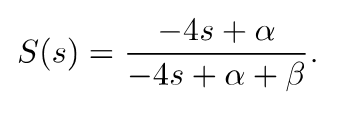Hello Engineering community,
I am currently studying Aerospace Engineering at TUM and have one module called Automatic Control Engineering. Right now, I'm just going through some practice exam questions. I stumbled upon one where I did not fully understand the answer of:
Given is the following disturbance transfer function:

The task is to determine the constants alpha and beta so that there is a steady state accuracy (stationäre Genauigkeit) in the closed control loop.
The answer was that 1. "In order for steady state accuracy with respect to disturbance to happen, the DTF S(s) must contain a zero and therefore alpha must be zero". 2. "All poles of the system must lie in the left complex half plane for stability therefore beta < 0".
What I understood was the 2nd part. I just do not understand the first part and why S(s) must contain a zero in order for it to be steady state accurate. Can anyone help me?